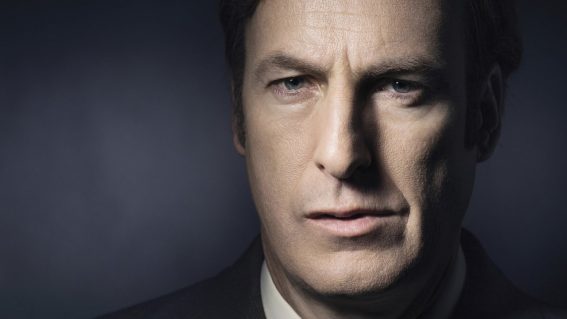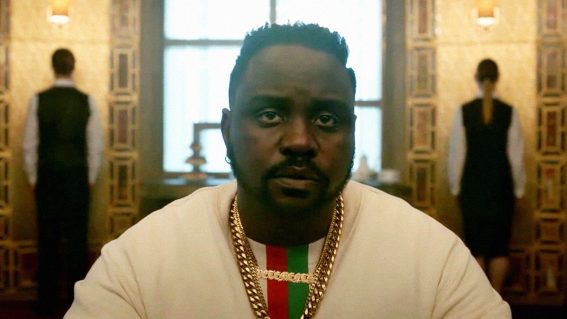The Handmaid’s Tale is back, as edge-of-the-seat and nail-bitingly tense as ever
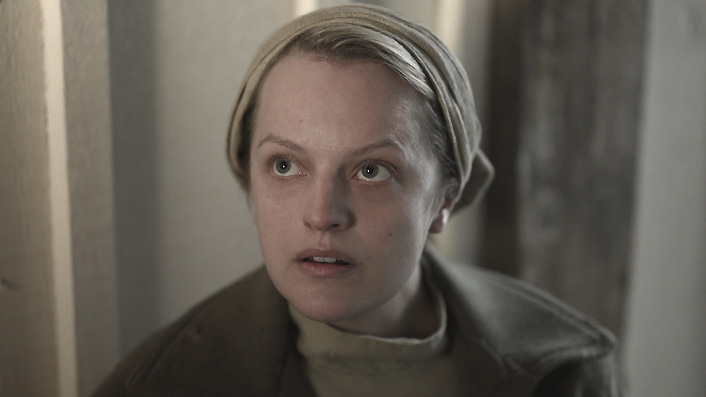
With the long-awaited, pandemic-stalled season four of The Handmaid’s Tale available to watch on Neon from 9pm on April 29 – Adam Fresco takes a look back at the series, and offers a sneak (spoiler-lite) peek at the first three episodes of the new season.
When I clicked onto the preview screener for season four of The Handmaid’s Tale, the welcome message said: “Enjoy the show”. But, as any fan of the dystopian sci-fi drama, based on Margaret Atwood’s novel knows, you don’t so much “enjoy” The Handmaid’s Tale as experience it in a perpetual state of on-the-edge-of-your-sofa tension.
It’s a show that does not let up. Ever. Because any time things start going well for protagonist, June (the electrifying Elisabeth Moss), you know that, sure as a rollercoaster car creeping slowly upwards, there’s gonna be one hell of a downward plunge coming. For every long, slow, deliberate scene in which June and her fellow Handmaids find freedom from the repressive, fascistic forces of Gilead, there’s the certain knowledge, after three seasons of brutal experience, that it won’t be long before there’s a patriarchal jackboot kicking in whatever door June’s found brief peace behind.
See also:
* Everything on Neon in May
* All new streaming movies & series
For those in need of a three-season binge, here’s the quick catch-up. Gilead is the totalitarian, patriarchal regime that rules over most of what used to be the United States of America. Following a decline in fertility, the ultra-right-wing Christian forces of Gilead have rounded up fertile women, called them Handmaids, and sent them to be baby-makers for The Commanders and their wives. These supposedly upright, male leaders of society may be dubbed Commanders, but their selfish, hypocritical, and often violent ways command them about as much respect as a nail has for a sledgehammer.
It’s a system built on force and fear. Disturbing and downright demented, these moralistic monsters impregnate their Handmaids in rituals that are little more than glorified rape, during which the barren Commanders’ wives literally hold their Handmaids down. It’s as disturbing as it sounds, but the genius of the series is that, despite being an overtly feminist text, it does not let women off the hook. This is no simple “men bad, women good” morality tale. Rather, it’s a complex, and all-too-convincing, dramatic portrayal of how powerful women in Gilead are complicit in the horrific treatment of other, lower-status women.
Take for example the terrifying Aunt Lydia. Think Nurse Ratched in One Flew Over the Cuckoo’s Nest, only less sympathetic, and you have an inkling of Lydia. Played with vicious aplomb by Ann Dowd, she trains Handmaids in brutal brainwashing, re-education camps designed to make Handmaids pliant and willing victims to the Commanders and their wives.
We first met June in season one, her husband and child ripped from her by war, and saw June reprogrammed by Aunt Lydia to be a Handmaid and assigned her first placement, with Commander and Mrs Waterford (Joseph Fiennes and Yvonne Strahovski, surely the most twisted and morally corrupt couple on television since Game of Thrones introduced the incestuous Jamie and Cersei Lannister). Forced to take her Commander’s name, June becomes “Offred”—quite literally the property “of Fred” Waterford.
As the first series progresses, the true terror is in realising that the Commander’s wife is far from a put-upon, oppressed, and confused victim. Serena Waterford is instead portrayed as an intelligent, powerful, independent woman who has not only allowed her husband, and his bigoted male compatriots, to oppress women in the name of religion, but was a lead architect in the creation of Gilead’s cruel, dehumanising society.
Far from excluding those who identify as female from perpetuating the highly paternalistic, sexist, fascism portrayed, the series deals with the complex complicity of women in their own submission. It’s a difficult and disturbing subtext, but one that makes the series compelling, shocking and stimulating for all, regardless of gender. Indeed, the original book’s author, Margaret Atwood, (who also acts as executive producer on the show), is keen to point out that nothing in the series is untrue. It is all taken from different cultures, countries, and times in history. Together, these extreme dystopian examples, ripped from reality, illustrate how we are all of us culpable. Perhaps that’s what keeps the show so brilliant (and terrifying) in the post-Trump era.
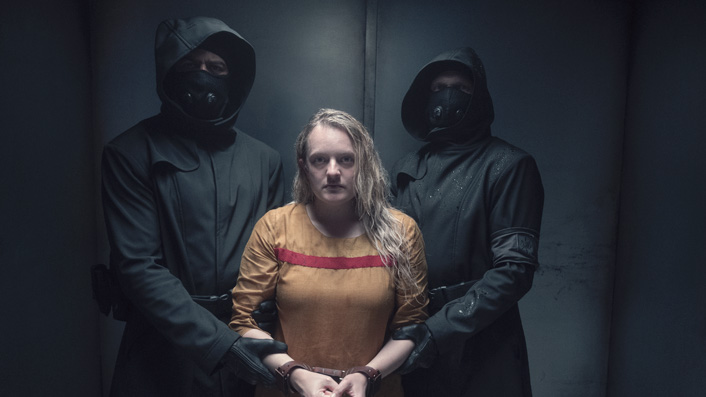
It’s not, despite Gilead’s Christian guise, an anti-religious show either. In fact, part of the show’s cunning is to portray the hypocrisy of those claiming to be holier than thou, so as to mistreat and abuse others in their sway. Seeing, over three seasons, how some Handmaids, including June, develop faith in a higher power, despite the cruelty of those who rule in the name of religion, is one of the show’s more subtle points. It’s not what you preach, but what you practice that counts, and every time the villains practice wickedness, claiming adherence to the Bible, it only serves to weaken them and highlight the moral corruption at the centre of the nightmarish society they have built in the name of their church.
Politics and religion aside, The Handmaid’s Tale is one of the most sumptuously shot, designed, and art-directed shows on television. Ever. Pretty much every frame’s a painting, whether it’s the light falling on baskets of fruit, and freshly baked bread in farmhouse kitchens, to shots of handmaids in bright red cloaks, walking against lush banks of white snow. Lovers of art history will have a blast, with references from periods of painting evocative of natural beauty, the ideal of simple farming, and an unspoiled, pre-industrial era America, all of which serve to contrast with the horrors of the society on display. Gilead may have an idyllic surface, but it’s a thin veneer, undercut by a society built on sexism, intolerance, extreme cruelty, and the ever-present threat of violence.
From the stunning musical score, and use of familiar songs, through to the sound design, costumes, locations and scripting, this is top-tier television that maintains a jaw-dropping level of technical craft. None more so than in the acting, with Elisabeth Moss simply stunning in the lead. Her portrayal of June is often completely dialogue-free, her eyes alone betraying her inner turmoil, in what amounts to a masterclass in acting from the inside. Flashbacks to June’s life, before Gilead destroyed the American Dream, allow Moss to fully round out her character as a strong, independent working mother and wife, with a rich, complex, and busy life.
The contrast with June’s stifled existence as a subservient Handmaid, in a seemingly bucolic Gilead, only serves to heighten the tension, with the threat of punishment always looming for those who dare question Gilead’s authoritarian system. It’s a threat made all too real by the bodies of so-called traitors that hang from the wall the Handmaids must pass every day on their way to the food store, flanked by armed male guards, and “Eyes”—ever-present, anonymous spies, employed by Commanders to ensure Big Brother is always watching.
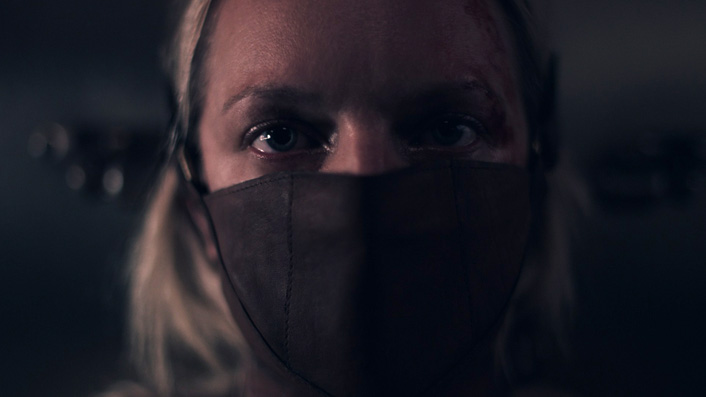
Moss is surrounded by an outstanding cast, portraying three-dimensional characters, with even the most villainous characters permitted just enough humanity and backstory to allow them to break free of caricature, portraying believable, flesh and blood people perpetuating all-too-human cruelty. Joseph Fiennes and Yvonne Strahovski as Fred and Serena Waterford are skin-crawlingly convincing as sociopathic zealots, so convinced of their righteousness that when their fascistic facades crack, it’s a shock to feel the shreds of humanity that still struggle in each.
Ann Dowd as Aunt Lydia is just as righteously bonkers as her character Patti in the superb series The Leftovers, but in The Handmaid’s Tale, Dowd takes humanising the inhuman to the next level. It’s a simultaneously horrifying and sympathetic portrayal of cruelty, lavished with good intent that is truly disturbing. Over three seasons, we have watched Aunt Lydia become the phrase: “The road to hell is paved with good intentions” writ large, and in season four she rightfully takes her place as a central villain of the piece.
Max Minghella continues to deliver a nuanced performance as Nick, Commander Waterford’s trusted Eye, now a Commander in his own right. Nick continues to walk both sides of the line, between his love for June and his powerful position as one of Gilead’s chief agents. It’s a precarious balancing act, and season four affords Nick a few welcome scenes with Bradley Whitford’s morally compromised Commander Lawrence. An early architect of Gilead, Lawrence is riddled with moral dilemmas and barely suppressed guilt beneath a veneer of dark sarcasm and blisteringly poignant comedic barbs, even as he faces possible execution by the state for his role in helping June and her Mayday rebels in season three.
In fact, every cast member and character ensures The Handmaid’s Tale is acted with such ferocious intensity as to never let the viewer escape the horrors of a fantasy world that lives and breathes so vividly. It never lets you simply sit back and enjoy the ride. Instead, you are plunged into an all-too-realistic portrayal of a society gone mad. Of religious extremity and human hypocrisy taken far beyond the realm of basic binary gender power politics, into the complex machinations of how, in trying to build a utopia for ourselves, we so often build dystopian hells for others.
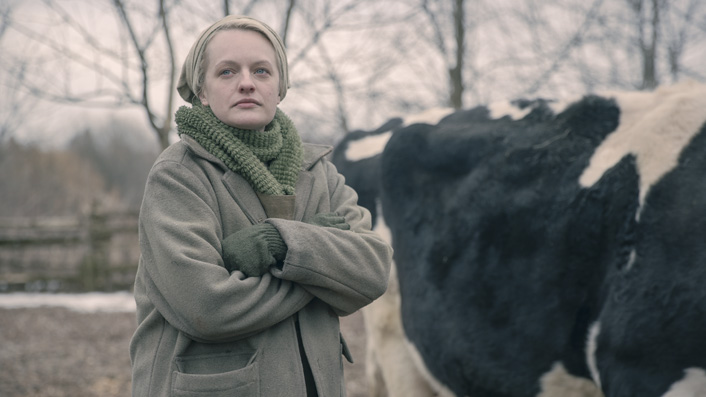
The new season kicks off with an episode aptly titled ‘Pigs’, in which June and her fellow Handmaids are on the run, having helped a planeload of children escape Gilead for Canada at the close of season three. Suffering from a bullet wound and severe blood loss, June finds a farm, run by a deeply disturbed, fourteen-year-old Commander’s wife (and child victim of Gilead’s horrific ingrained male abuse), who sympathises with June’s rebel Mayday alliance.
Meanwhile, captive in Canada, the Waterfords learn of June’s so-called “Angel’s Flight”, and the eighty-six children liberated from Gilead which may be enough to spark a war, should Gilead’s leaders decide to take them back by force. It’s these season four scenes set in Canada, in which we see those June helped escape the ravages of Gilead, that serve to highlight the horrors June faces. Freedom in Canada is presented in such a drab and ordinary way, as to make the bucolic scenes of idealised country life in Gilead seem by contrast, even more surreal.
It is as if June’s husband and former friends inhabit a totally different planet. It is a place that looks and feels alien. A place of mobile phones, takeaway coffee, cars, and television. A place so far removed from Gilead as to make freedom seem a dream. It is a place of freedom so commonplace and taken for granted, those living it cannot see its fragility. Indeed, many of the children rescued by June and her fellow Handmaids and Marthas (the generic term for Gilead’s housemaids), have only known life in Gilead.
It is a testament to the show’s realistic psychology that, rather than being overjoyed at being liberated, some of the children miss their so-called family and home back in Gilead. It is a cruel, but startlingly honest portrayal of the realities of kidnapping children so young, and indoctrinating them so completely, with the perverse, extremist religious belief that Gilead instills in its citizens as ruthlessly as the almighty ‘Party’ who rule Oceania in George Orwell’s classic dystopian warning 1984.
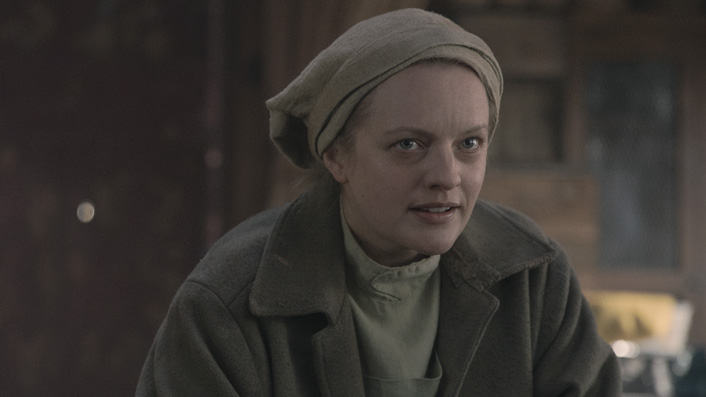 From Stalinist Russia to Hitler’s Germany, from Trump’s MAGA-hatted presidency to the patriarchal extremists heading present-day regimes, The Handmaid’s Tale never lets you forget that this is fiction only a few degrees of possibility away from our own reality. It’s a dystopian nightmare filled not with unfeeling monsters, or inexplicable Lovecraftian demons, but with real people, who in setting out to do what they claim to be righteous, have created a living hell for others, and often, perversely, for themselves.
From Stalinist Russia to Hitler’s Germany, from Trump’s MAGA-hatted presidency to the patriarchal extremists heading present-day regimes, The Handmaid’s Tale never lets you forget that this is fiction only a few degrees of possibility away from our own reality. It’s a dystopian nightmare filled not with unfeeling monsters, or inexplicable Lovecraftian demons, but with real people, who in setting out to do what they claim to be righteous, have created a living hell for others, and often, perversely, for themselves.
As June tells the farm Commander’s child-wife in season four: “Gilead makes it real hard to be good.” So too, The Handmaid’s Tale may be damn good television, but sometimes watching it can be hard. So, don’t relax. The Handmaid’s Tale is back, and as adult, intelligent, rewarding, scary, tense, edge-of-the-seat, and nail-bitingly hard as ever.





